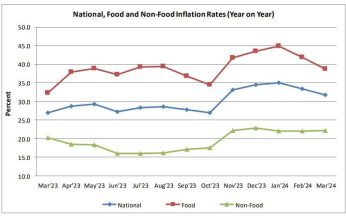Going commercial with farming

Cisanet says Malawi, an agro-based economy should have embraced farming as one of the most profitable activities.
National director of Civil Society Agriculture Network (Cisanet) Tamani Nkhono-Mvula observed, however, that this has not been the case as agriculture is currently facing a lot of challenges in the country.
In his view, the major challenge making commercial agriculture not so profitable is the underdevelopment of the local market as well as the lack of local value addition to the agricultural products.
“Most, if not all of what we produce is sold raw and this makes the profit margins for the farmers to be very low. There has been a wave of talk to develop agriculture cooperatives; however, most of these cooperatives are doing little value addition,” noted Nkhono-Mvula.
He observed that agriculture cooperatives could be one way of making agriculture to be taken as a business and help farmers get more benefits.
The other challenge facing commercial agriculture, according to him, is lack of credit.
“Malawi does not have an agriculture bank and the commercial banks that we have consider agriculture to be a risky venture for them to invest in. As such, getting loans from the bank for agriculture is not easy,” noted Nkhono-Mvula.
He said that this has resulted in the country’s agriculture being stuck in subsistence farming and using primitive implements.
One of the country’s well known commercial farmers, Felix Jumbe, noted that commercial farming is profitable; adding that in most countries in the world it is a proven undertaking that provides livelihood and creates wealth for the majority.
He noted further that currently in the country, commercial farming is not as profitable as it used to be.
“The macro economic factors are not favourable, with the inflation rate at 28 percent, for instance. At 38 percent, interest rate swallows the supposedly profit made by the commercial farmers once in a year,” said Jumbe, adding that in order to survive under Malawian conditions, one has to undertake integrated farming system which he practices. With this system he is able to beat the high interest rates.
Apart from that, Jumbe noted that policies, legislations and regulations of marketing farm commodities are still colonial, with a lot of barriers to export.
The Cisanet national director agreed that the policy environment in the country is not helpful, with so many trade and export bans being imposed by government on crops such as soya and other legumes.
According to him, such bans stifle growth of these value chains and take away the incentives for growth.
In addition, Jumbe noted that commercial farming in the country has been more on tobacco than any other crop, resulting in restrictions of some sort to others.
“Our commercial farming has been more on tobacco than any other crop and others have been restricted due to lack of labour saving technologies such as combine harvesters, tractors and other things, so we have a situation where we have corporate commercial farmers but still small-scale because they are using tools of a smallholder farmer at large-scale,” said Jumbe.
He believes, therefore, that the prevailing factors have made farming a challenge.
“Farming is always profitable in countries where government is able to control expenditure to have low interest rates and productivity is high because they can afford to use labour saving technologies,” said Jumbe.
According to him, commercial farming used to stand at 25 percent but is now less than 10 percent. He attributed the fall to the factors of lack of support mechanisms such as financing as well as the prohibitive interest rates.
However, Farmers Union of Malawi (FUM) director of policy and institutional development Jacob Nyirongo pointed out that it is important to realise that commercial farming can be done even by smallholder farmers.
“Large-scale farming in Malawi was mostly in the tobacco sub-sector, however, currently large-scale farming is diversifying into other crops such as legumes apart from investment in tobacco production.
“However, smallholder farming remains the major engine of production in the country. Most of the large farms in the country are idle and with limited infrastructure such as water harvesting facilities such as dams and warehousing facilities,” he said.
Although commercial farming is profit driven, it is without question, able to feed a rapidly growing population, and as a result it continues to be of vital importance in various societies.
Government is working to intensify commercial farming in the country. Two departments are going to be established in the Ministry of Agriculture and Food Security; one of them focusing on rural and subsistence farming and the other one focusing on commercial farming.
President Joyce Banda stated that this is intended to make commercial farming a clear priority.





